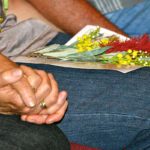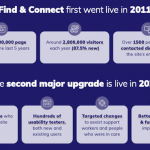The Life Stories Project is Wrapping Up
- Nov 26, 2021
- In Uncategorized
Guest Post: Simon Gardiner, Alliance for Forgotten Australians, Life Stories Project
We first heard about the Life Stories Project back in February. The Project will finish at the end of December 2021 (referrals are no longer being accepted).
The Life Stories Project is an initiative of the Alliance for Forgotten Australians. Funding has been provided by the Department of Social Services. The Life Stories Project supports people who spent time in “care” before 1990, Former Child Migrants and Stolen Generations to tell and record their own story. A story may focus on the experience in “care” and its impacts and/or on their later adult life. It can provide the opportunity to correct any personal records which may be inaccurate or offensive.
To tell a story suggests that the storyteller has hope. And with hope, there is a future. The value of storytelling, in the end, returns to meaning. Meaning, for all of us, can be found in so many aspects of our lives: children, a relationship, finding family, acquisition of skills and recognition, reconciliation via redress and an apology.
Life Stories Project, Simon Gardiner
The Project provides an opportunity for those who spent much/all of their childhood in “care” to write an account of their life that honours and records their experiences. Despite the best efforts of advocates, the circumstances of children who were brought up in institutional “care” in the twentieth century are still largely unknown. The voices of these people remain largely silent. The Project has given witness to these voices and has enabled them to create a tangible and accessible record of their life.
By 31 December the Project expects to have completed 60 life stories. Each participant who completes their story receives 20 hard copies of their story and access to a link to enable additional professional copies to be printed. Many participants have chosen to send a copy of their story to the institution(s) they spent time in. Consent is being sought from all those who complete their story to have their story included in the State Library of Victoria as a Life Stories Collection.
Preparation for story telling is important. Firstly, the co-ordinator has a number of preliminary conversations with potential participants covering readiness and support needs. Some initial prompt questions are provided. Story telling only begins with the completion of a consent form.
As children we should never have been put through it. I look at the TV today and see stories of paedophiles abusing kids in care. My abuse happened to me nearly 60 years ago. It is still happening to the kids in care today. These are the kids who, like me, come from poor families.
Remembering a survivor of institutional abuse, Simon Gardiner, Coordinator Life Stories Project, with permission from Bob and his family
The process of storytelling generally involves talking with a writer over a number of sessions; each session lasting no more than hour. Some stories may require over ten sessions, others four or five. After each session the discussion is promptly written up. The draft provides some order and structure. The draft is sent to the participant for review and amendment. At the next session the process begins again. Some participants bring their own writings (often handwritten) to the process. These are used as the basis for the story. The finished story includes photos and other documents relevant to their experience, for example a copy of a page from a ward file.
Salman Rushdie explains the importance of storytelling like this:
Those that do not have the power over the story that dominates their lives, the power to retell it, to rethink it, to deconstruct, joke about it and change it as times change, truly are powerless because they cannot think new thoughts.
Stories are our personal and private testimony; proof that our lives matter.
It has been an honour to participate in this Project. I thank all those who have taken part, both Forgotten Australians and Project writers. I also thank the Alliance for Forgotten Australians and the Department of Social Services for their support.
Simon Gardiner, Life Stories Project co-ordinator
27 October 2021







Philip Hodges
November 26, 2021 1:26 pmHello to you and everyone else. I just don’t understand why Social Services is no longer funding Life Stories? They know how important it is to us. They can’t use the funding as a excuse. I just think Services Australia don’t want to know the truth and the whole truth, simply because they can’t handle the truth.
Find & Connect
November 26, 2021 4:10 pmThanks for your comment. The Life Stories Project was initially funded for 12 months (you can see more on it here: Life Stories Project. Find & Connect is not involved in the project, it is an initiative of the Alliance for Forgotten Australians. It’s a wonderful project we’re happy to share on the blog but unfortunately we can’t assist with any information regarding funding or future plans for the project. We will pass on your comment to the project coordinator who may be able to assist you.